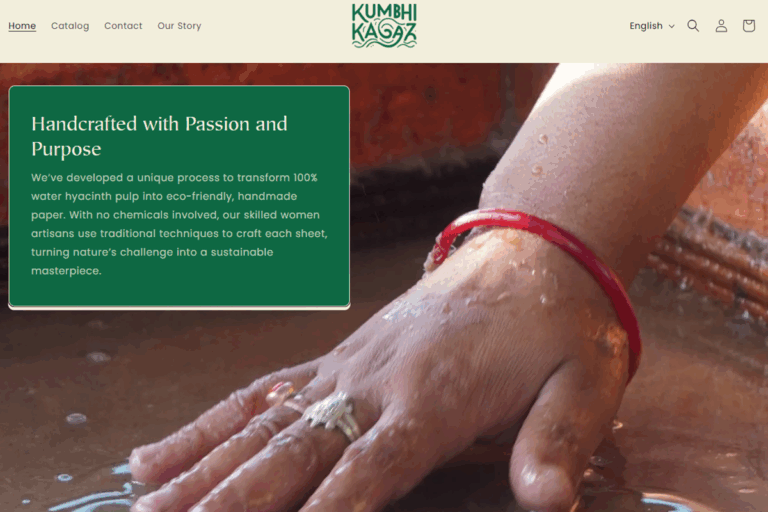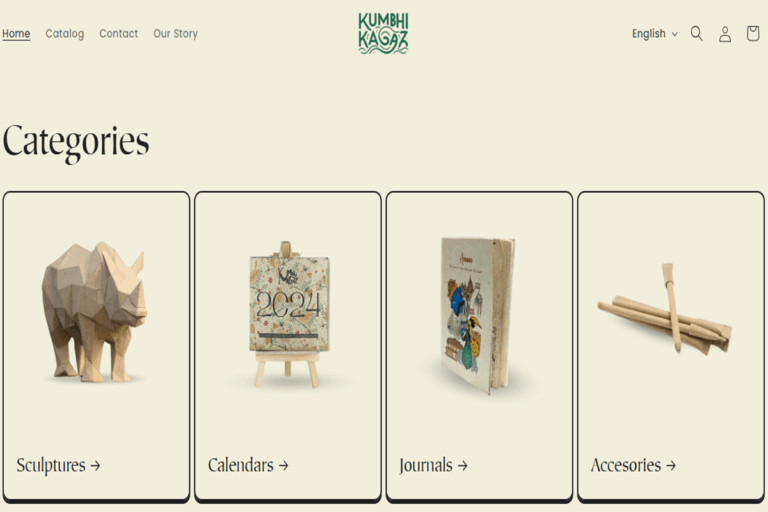Officially incorporated in May 2022, by Rupankar Bhattacharjee and Aniket Dhar, Kumbhi Kagaz Pvt. Ltd (KKPL) works to control the invasive species of water hyacinth. It causes ecological imbalance in Assam’s wetlands, especially at Deepor Beel, the region’s only Ramsar site.
How Come the Founders Decided to Work in This Direction?
Ye us samay ki baat hai jab when co-founder Rupankar (an installation artist and wildlife enthusiast) came across water hyacinth while working on conservation projects.
It is not an unknown fact that these species are known as the Terror of Bengal due to their disruptive qualities.
Being familiar with ancient and chemical-free techniques to make paper, Rupankar, along with other co-founders, started experimenting to turn water hyacinth into handmade and biodegradable paper.
Sounds interesting!
COVID-19 Lockdown, the Time When Ideas Turned into Reality
Yes, the founders used the leisure time available during the pandemic and conducted numerous experiments. Eventually, the team developed a chemical-free and printable handmade paper by the mid-2020s.
Once the prototype was ready and feasible, each founder invested Rs 1.5 lakh for setting up basic manufacturing operations.

Struggles and Challenges
Several challenges came along the way in KKPL’s journey:
- Technical Barriers: Extensive research with numerous trial and error experiments were required. It was time-consuming, plus, the need to ensure that the end-product was suitable for printers as well.
- Resource Constraints: Since bootstrapped and followed manual manual processes, the startup lacked access to advanced machinery or chemicals.
- Market Acceptance: It is a never-ending struggle to convince consumers and businesses to adopt eco-friendly, handmade paper over conventional wood pulp-based products. Thus, they followed persistent outreach and organized awareness campaigns.
- Supply Chain: It was a logistics challenge to sustainably source water hyacinth from Deepor Beel and surrounding wetlands, while actively engaging the community and promoting ecological restoration.
- Employment Generation: To generate livelihoods for local communities, especially for women, was challenging because training and social mobilization was required.
Awards and Grants

In 2021, the team was operating as Inside Out. At that time, it won the global WasteAid Zero Waste Cities Challenge and secured approx. ₹7.84 lakh grant.
Also, KKPL became the only startup from Northwest India to receive ₹7 lakh from Downtown Venture Labs (under MEITY) and ₹20 lakh from the India Water Pitch Pilot Conclave.
Community Impact
KKPL’s model was effectively addressing the environmental challenge posed by water hyacinth. Simultaneously, it was providing economic opportunities for local women and rural communities. All this, in line with their mission of circular economy and sustainable development.
Product Development: Diverse Uses of Chemical-Free Paper
The paper manufactured by KKPL is of 100–300 gsm. It is easily converted into notebooks, business cards, calendars, and customizable products.
Monthly, the company makes around 2,000 sheets. Presently, its products are sold in Assam and a few other states. However, the founders are planning to begin exporting the same.
Market Response
Finally, the hardwork by the team paid off as now KKPL’s products have strong demand. Its products often sell out quickly, which enables the company to expand operations and facilities.
Moreover, both consumers and institutional buyers are impressed with the company’s eco-friendly branding and social impact.
Revenue and Financials
KKPL’s has not publicly revealed any specific figures in terms of the revenue. However, the company’s ability to attract grants, maintain profitability, and expansion shows that it is running successfully.
It is noticeable that KKPL has been highlighted in sustainability events and discussions about green manufacturing and rural support.
But Why Water Hyacinth is Called the Terror of Bengal?
- It forms dense mats on water surfaces, which blocks sunlight, depleting oxygen. This disrupts aquatic ecosystems and reduces fish populations, further harming the livelihoods of fishermen.
- It grows rapidly and can double its population in just two weeks.
- Water hyacinth increases water loss through evaporation by 2.5 to 3 times compared to uncovered water. This results in hydrological changes in affected regions.
- These species are a breeding ground for mosquitoes and other parasites, which increases the risk of diseases: malaria, cholera, and diarrhea in local communities.
- Inland navigation, fishing, and irrigation is also disrupted as it clogs rivers, canals, and wetlands. This leads to economic losses and makes transport difficult.
- Once this weed spreads in the agricultural feeds, it destroys crops like paddy and jute, resulting in crop destruction leading to famine (in worst case scenario).
- Eventually, its proliferation destroys natural wetlands, exacerbates flooding by blocking water flow.
- It also causes extensive damage to the region’s ecology and economy.
From Kumbhi Kagaz Pvt. Ltd’s journey, it is evident that with innovation in environmental entrepreneurship, overcoming technical and market challenges, it is possible to create a profitable and impactful business for both people and the planet.




